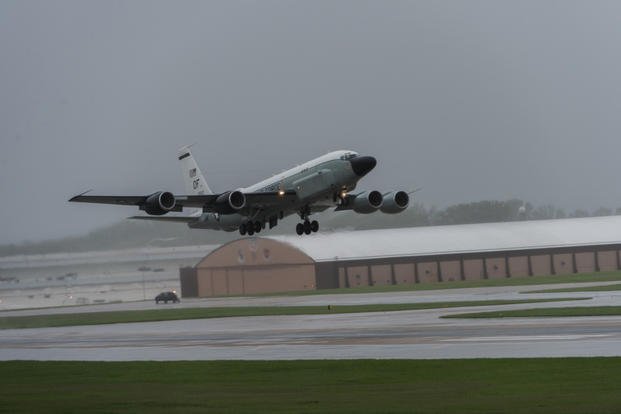The recent flooding at Offutt Air Force Base, Nebraska, has slowed down mission crew training on the RC-135 intelligence, surveillance and reconnaissance aircraft, leading the Air Force to send airmen as far away as the United Kingdom to train, according to a top general.
Gen. Mike Holmes, head of Air Combat Command, said Tuesday that the loss of the aircraft simulator complex at Offutt due to flooding has caused a "problem" for the RC-135 force.
"Fortunately, we're able to take advantage of some allied capabilities, the [Royal Air Force's] simulator capabilities," Holmes told reporters during a Defense Writers Group breakfast in Washington, D.C. "We're able to train on the airplane; it'll have an impact, though, on our capacity to train."
ACC, the major command that oversees the 55th Wing assigned to Offutt, has been sending crew members and instructors "to RAF Waddington, U.K., and Greenville, Texas, to take advantage of simulators at those locations," spokeswoman Alexandria Worley told Military.com on Wednesday.
Related content:
-
RC-135 Reconnaissance Aircraft Return to Offutt as Flood Recovery Continues
-
Dozens of Buildings Underwater at Offutt Air Force Base After Massive Flood
-
Repairs to Tyndall, Offutt May Delay Funding for Air Force Base Upgrades
-
Offutt Air Force Base Cancels Airshow after 'Historic Disaster' Floods
However, Worley said those simulators "do not have the same capacity that the simulators at Offutt did," so the wing is also using RC-135 aircraft on the flight line to "provide some basic equipment training and flying additional training sorties in order to provide higher-end training that was accomplished in [Offutt's] simulators."
The flood impacted at least three of the base's RC-135 ISR variant simulators, according to Air Force Magazine. The publication visited the installation in June, reporting that part of the training had been relocated.
Two pilot flight deck simulators were down for "one month" until they were restored April 15, Worley said.
But it will cost more than $200 million to repair the damaged mission crew simulators, she said.
"Offutt's RC-135 mission crew simulators should be restored to limited capability in approximately six weeks," Worley said. "With limited capability, the simulators will not be able to connect with other simulators and members will not be able to train simultaneously. The mission crew simulators are estimated to be restored to full, pre-flood capability approximately 17 months after funding is received."
ACC trains 1,063 airmen on those simulators annually, including roughly 300 as brand-new crew, she said in an email. There are normally 10 to 15 RC-135 aircraft stationed at Offutt.
In March, floodwaters hit Offutt after water levels rose and broke levees on the Missouri River and Papillion Creek, also known as "Papio" Creek.
The "500-year flood" prompted the Air Force to shut down dozens of structures and caused at least $420 million in just cleanup and repair damages at the base.
The 55th Wing fleet at Offutt includes the RC-135V/W Rivet Joint, RC-135S Cobra Ball and RC-135U Combat Sent surveillance and reconnaissance aircraft, which have maintained a constant presence in the Middle East since the early 1990s, according to the service.
Trainees are going through various pipelines, ACC said.
Some are in initial qualification training for new RC-135 mission crew members; requalification training for previously qualified airmen who are returning to the RC-135; continuation training for qualified crew to keep them current in aircraft systems and operations; and instructor training to qualify crew members for positions of increased responsibility in the aircraft, the command said.
"The simulators provided 75 to 80 percent of the mission crew training," Worley said. "ACC mitigation efforts can partially, but not completely, offset the training capacity lost when the simulators were destroyed. This is resulting in a bottleneck in training where mission crew members are waiting to be trained."
Editor's note: This story has been updated to correct how long it will take to repair the simulators. Worley corrected her original statement.
-- Oriana Pawlyk can be reached at oriana.pawlyk@military.com. Follow her on Twitter at @Oriana0214.












